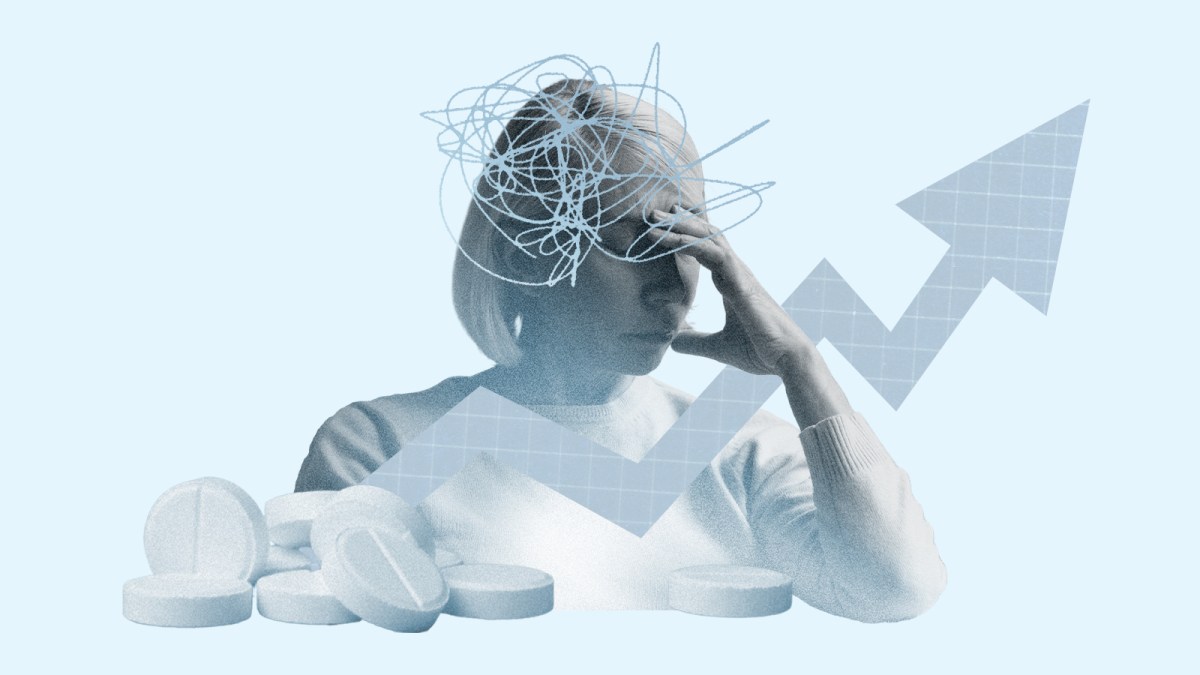More than 3.8 million people in England, including one in six women over 50, have been taking antidepressants for five years or longer, a Sunday Times investigation has found.
Figures obtained from NHS England using freedom of information laws reveal that the number of people prescribed antidepressants over the long term has almost doubled from two million in 2022.
About 7 million people in total are currently taking antidepressants in England, equivalent to 12 per cent of the population.
The use of antidepressants has increased since the pandemic amid a rise in anxiety and mental heath problems. There have also been long waits for therapy, which is often used alongside medical treatments.
Long-term use of antidepressants, while often effective at managing chronic depression, carries several risks. Physically, it may lead to weight gain, risks to pregnancy, sexual dysfunction — which can continue after stopping medication — and an increased risk of conditions such as diabetes and osteoporosis.
Some people experience emotional blunting and cognitive dulling, and difficult withdrawal symptoms when coming off the drugs or missing a dose. Patients report a lack of awareness of the symptoms of withdrawal and a lack of support for safe tapering to minimise them.
Overall, women are more likely than men to be prescribed antidepressants, and are more likely to stay on them long term. The analysis showed that 4.6 million women — 16 per cent of all women in England — are on antidepressants. The figure for men is 2.4 million men, or 9 per cent of the male population. Across all of England, 7 per cent have been on antidepressants for five years or more.
A quarter of all women in their fifties and sixties are currently taking antidepressants, and 15 per cent of women over 50 have been taking them for longer than five years — almost double the proportion of men.
Many women in this age bracket are first prescribed the drugs after seeing their GP with symptoms of the menopause, which can be confused with depression.
Clinical psychiatrist Dr Quratulain Zaidi, has described how women experience a confluence of stress factors on their mental health during the “sandwich generation” of midlife when they can face escalating career responsibilities, the menopause and changing family dynamics, either raising children or having them leave home, and also looking after elderly parents. This can lead to chronic stress, especially as women tend to “put themselves bottom of the list,” Dr Zaidi has said.
In an interview she said: “What I’m seeing more and more, even in my own practice, is that people in this age group are finding it very challenging.
“Being able to manage the care for your ageing parents, especially if you’re living away from them, while also managing family dynamics with siblings – all without feeling constantly guilty — is a real struggle many women face.”
While one in six adults in England are on antidepressants, in Scotland and Northern Ireland the rate is one in five. There are no official statistics on the number of adults on antidepressants in Wales, but research suggests it is close to one in six.
The Royal College of Psychiatrists states that antidepressants are effective at reducing the symptoms of moderate to severe depression, particularly when combined with therapy.
There is limited evidence of the benefits of taking antidepressants over a longer period, however, and inadequate support for patients attempting to discontinue antidepressants, many of whom experience withdrawal symptoms.
Antidepressants should not be stopped abruptly. The longer patients are on them, the more likely they are to experience withdrawal symptoms when discontinuing.
Dr James Davies, an author, psychotherapist and professor who advocates for greater provision of non-medical mental health interventions, said: “We’re prescribing antidepressants for mild depression when the evidence base suggests they’re no more effective than placebos. But unlike placebos, they have side-effects. About half of patients struggle to come off these drugs, and a large proportion experience protracted withdrawal.
“The imbalance isn’t in our brains, it’s in our provision. We need social, psychological, community-based alternatives.”
Dr Louise Newson, a GP and menopause specialist, said common symptoms associated with perimenopause, such as low mood and anxiety, were often misdiagnosed as depression.
She said: “This happens far too often. Nice [National Institute for Health and Care Excellence] guidelines clearly state that hormone replacement therapy [HRT] is the first-line treatment for low mood related to menopause, yet antidepressants are frequently prescribed instead, often without any discussion about hormones.”
Newson said this occurs due to a lack of understanding among healthcare professionals and the ease of prescribing antidepressants in comparison with HRT, the availability of which she described as a “postcode lottery”.
“If more women had better access to hormones then this would reduce prescribing of unnecessary medications, improve long-term health [and] reduce mental health symptoms in women,” she added.
Wendy Austin, 50, a geography teacher from Nottingham, has been offered antidepressants numerous times since becoming menopausal.
She had previously taken them when she was younger but experienced, negative side-effects, including suicidal ideation. When she was diagnosed as perimenopausal in her late thirties, she began to track how her symptoms fluctuated with her menstrual cycle and found her mood swings and migraines were linked to hormonal changes.
‘All the time I was on antidepressants, I just got worse and worse’
She said: “At one point a GP who wanted to give me antidepressants suggested I should be signed off on long-term sick leave. If I had listened to her, I would be zoned out, on benefits and a financial drain on the country, rather than a force for good. All the time I was on antidepressants, I just got worse and worse.”

Austin struggled to get her GP to consider that her symptoms may be hormonal and feels she has got her life back since being prescribed HRT
WENDY AUSTIN
Eventually she received a referral to a specialist who prescribed her HRT.
She added: “It’s with hormonal treatment that I’ve finally got my life back. Now I do triathlon, musicals, dancing and teach full-time in a mainstream school,” she said.
Long-term sickness is the primary reason for women over 50 being economically inactive. One in ten women leave work due to menopausal symptoms, research by the Fawcett Society has indicated.
The rate of suicide in women of menopausal age is increasing year on year. Women aged 45 to 64 have the highest suicide rate of any age group among women, according to data from the Office for National Statistics.
The number of patients in England being prescribed antidepressants has risen by 45 per cent over the past decade.
While some people coming off antidepressants will never experience problems, others suffer withdrawal symptoms, which occur when you stop a drug your body has become used to. These include “brain zaps” — which feel like electric shocks in the brain — nausea, insomnia, physical pain, restlessness, vision and memory problems, and many others.
The data also showed an increasing number of teenagers were being prescribed antidepressants. In 2015, just 0.54 per cent of under-19s had a prescription, but this had more than doubled to 1.13 per cent by 2024 — a total of 118,000. Of these, 12,000 have been on the drugs for more than five years.
While guidelines state children should be prescribed antidepressants only in conjunction with therapy, this is not followed in practice, as the average waiting time for children to receive treatment exceeds 100 days.
Waits for psychological therapy have reduced in some areas, but in around a quarter of localities the median wait time has doubled since the pandemic, according to research by the Institute of Fiscal Studies.
Carrie Clark has been taking antidepressants for two decades. She was first prescribed them when she was 14 years old after the death of her father. She says a doctor offered her a prescription after a consultation lasting just 15 minutes.
Now 34, Clark says she feels “trapped” on the drugs. An attempt to come off them in 2023 left her suffering months of withdrawal symptoms — she had wanted to start a family and was concerned about the risks of taking the drugs while pregnant.

Carrie Clark, 34, struggled with debilitating withdrawal symptoms when attempting to come off antidepressants
ADRIAN SHERRATT FOR THE SUNDAY TIMES
She said: “There is my life before I experienced antidepressant withdrawal, and there is my life after.’
‘Withdrawal was the most terrifying thing that has ever happened to me’
“I can’t emphasise this to you enough. It is the most terrifying thing that has ever happened to me,” she added. “It’s like a scar on my life. I had brain zaps that would wake me up in the middle of the night. I had incredibly painful burning pins and needles up and down my spine, shoulders and back. I had dizziness, visual distortions and an all-pervading terror. I was pacing, weeping and barely comprehensible.”
In the end, unable to tolerate the withdrawal symptoms, Clark went back on antidepressants. She is now planning to taper off slowly over five years. Like hundreds of thousands of others seeking help on online forums, she plans to use pill cutters to reduce her dose slowly, as manufacturers don’t produce enough varieties of dosages to facilitate safe tapering.
Unwilling to risk getting pregnant while on antidepressants due to the risks — which can include newborn experiencing withdrawal too — she is now concerned she has been robbed of her chance to become a mother.
“I was so young when these drugs were prescribed, and the distress that I was experiencing was totally explicable based on the events that had happened in my life. I wasn’t warned about the possibility of withdrawal. I wasn’t warned about the lack of safety in pregnancy. It’s the most terrifying feeling realising that you’re trapped on these medications,” she said.
In 2019, the NHS updated its guidance to reflect the fact that withdrawal can be severe and long-lasting for some patients. Mark Horowitz, a clinical research fellow at the NHS who studies how to safely deprescribe, said many patients who present with withdrawal symptoms were being dismissed by their GP.
“The level of denial is utterly mad. There are now hundreds of thousands of patients online discussing their withdrawal symptoms who feel like their doctors have failed them. This is a huge medical scandal,” he said. About 15,000 patients have emailed him for help in tapering off their medications and his waiting list now exceeds a year.
Horowitz would like greater support for patients discontinuing medication, and for manufacturers to be obligated to research safe discontinuation.
“If we’re talking about a car regulator bringing cars onto the market that couldn’t be stopped safely, that would be an outrage,” he said. “But that happens all the time with medications.”
The Royal College of Psychiatrists said: “Long-term use of antidepressants should only be considered for people that have recurrent depression and repeated, severe relapses after stopping antidepressants. For those patients, the beneficial effects of continuous use of antidepressants are more likely to balance the potential risks. However, this should be reviewed regularly, and multiple attempts should be made to stop taking these medications after prolonged periods of established wellbeing”.
The Royal College of GP’s said: “Wherever possible we don’t want patients to have to rely on medication long term, and most patients don’t want that either. As part of the management of a patient’s treatment, GPs should aim to have regular medication reviews to consider whether the treatment is still optimal, whether to reduce the dosage or stop taking medication altogether. If a decision is made to end a course of treatment, this should be medically supervised with appropriate safeguards in place.”
